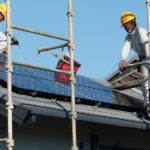Posts tagged with 'energy efficiency'
In the past few years, large commercial building owners and managers have expressed growing interest in using behavioral strategies to improve their buildings’ performance. That interest often takes the form of “occupant engagement,” whereby tenants are encouraged to adjust their ...

“If you want to win the climate change battle, it will be fought in the cities of the world,” WRI President and CEO Andrew Steer told participants at a forum on the role of urban areas in the global shift to clean ...

Urbanization presents major challenges: congestion, sprawl, inefficiency, health hazards and high cost of living, just to name a few. But the choices we make for our cities can transform these challenges into opportunities: mobility, connectivity, economies of scale, healthier lifestyles ...

Bangalore is India’s third most populous city and is among the top 100 cities that contribute to the global economy. 75 percent of Bengaluru’s income is from the service sector, with over ₹ 500 billion (approximately US $7.6 billion) from ...

Shenzhen, Buenos Aires and Kiev’s experiences pursuing energy efficiency demonstrate that there is no one-size-fits-all solution to achieving better buildings. Each found a unique path to improve energy efficiency for a more sustainable and prosperous city. Shenzhen Goes Above and ...

On February 23 the World Business Council for Sustainable Development (WBCSD) launched the Energy Efficiency in Buildings laboratory (EEB Lab) in Shanghai. In a city where 18.4 percent of emissions come from buildings, the EEB Lab is engaging local stakeholders ...

For some building owners, renovations—including retrofitting heating, cooling, and lighting systems—can be a way to attract tenants. For homeowners, improving insulation can make for more comfortable as well as energy efficient homes. For industry, more efficient equipment means expanding production ...

Globally, India ranks fourth in energy consumption, but it is not well endowed with energy resources. Being the second most populous country in the world, how India manages its industrialization and urbanization process will matter for national and global concerns ...

The trouble with not having a goal is that you can spend your life running up and down the field and never score — Bill Copeland. Goals help provide our everyday lives with structure, and operate similarly at the institutional ...

WRI Ross Center for Sustainable Cities in Turkey will host the 3rd Livable Cities Symposium on November 19-20, 2015 in Istanbul. The Symposium will gather national and international experts, practitioners and researchers to discuss energy and transportation policies, community engagement, and ...

Cities have proven themselves to be necessary in combating climate change; however, the current trajectory for urban growth is still an unsustainable path and carbon emissions are already expected to surpass thresholds considered acceptable. One of the largest problems is ...

The U.S. Green Building Council (USGBC) recently released a real-time building monitoring and scoring platform called LEED Dynamic Plaque, enabling building managers to benchmark, monitor, and improve their building’s performance on an ongoing basis. The program has been recognized as ...

Urban residents around the world have different daily routines, but they share something in common that often goes unappreciated. Let’s take the example of how a city dweller in China spends an average day: 8 hours of work activities 30 ...

Investing in resource efficiency helps cities and their residents by cutting energy and water costs, creating jobs and creating cleaner, healthier air. And making cities more resource efficient is critical to reducing greenhouse gas emissions and combating climate change. Improving ...

In 2012 alone, Latin America saw 131,000 preventable air pollution-related deaths. To reduce emissions and improve air quality, it’s essential that public transit fleets—like buses—become more fuel-efficient. Adopting cleaner fuels—like natural gas or low-sulfur diesel—and upgrading to technologies that produce ...

Page 5 of 7« First...456...Last »

























